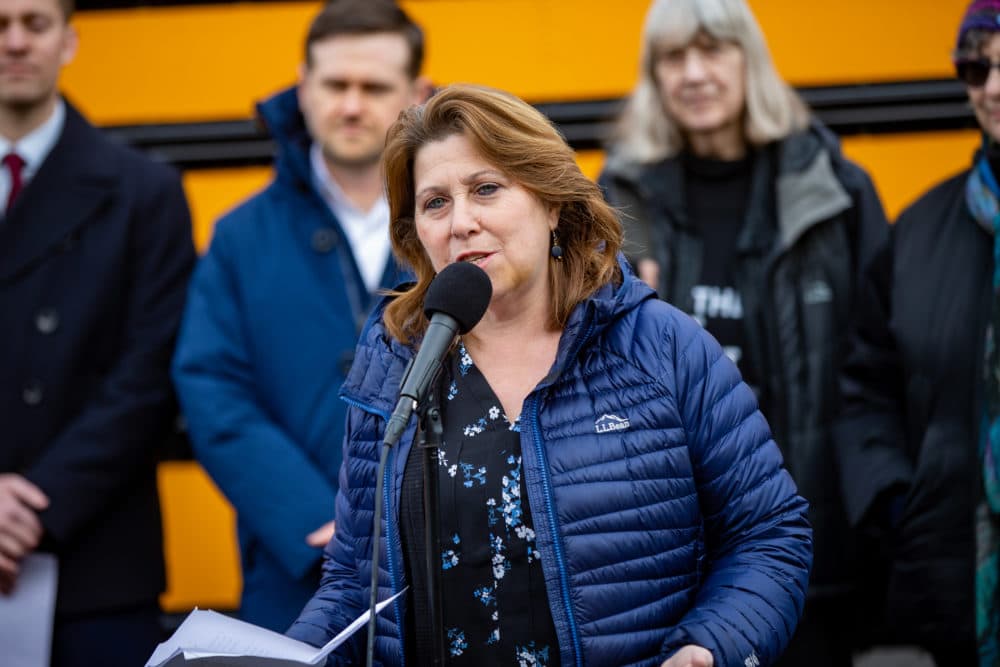Advertisement
A year in, BPS superintendent earns passing marks — with 'a great deal' still to do

Nearly a year into running the Boston Public Schools, Superintendent Mary Skipper has received a mixed-to-positive first evaluation.
Though they gestured at areas for improvement, the seven members of the Boston School Committee judged Skipper to have been “proficient” overall in her first year.
On a numerical scale ranging from 1 (“Ineffective”) to 5 (“Highly Effective”), the members’ overall scores average to 3.7 — slightly below the mark of 4 Skipper gave herself in a self-evaluation submitted in July.
The annual evaluation was published Wednesday afternoon and discussed at a school committee later that evening. It is grouped into four categories, including instructional leadership, management and operations, family and community engagement and professional culture.
Skipper took the helm of the state’s largest school district — with around 50,000 students projected this fall — last September. That was just months after city and district leaders agreed to a “systemic improvement plan” with Massachusetts education officials, averting the possible state takeover of BPS.
Her first year was marked by unusual scrutiny: Skipper received regular audits about the district’s shortcomings — in areas from special education to transportation and data handling — that she is now tasked with improving.
Even as they praised Skipper for confronting that work, some school committee members said the district still suffers from longstanding problems, like superficial or delayed community engagement. Others pressed Skipper to develop a fair and coherent master plan for school buildings.
In their summative evaluation, committee members acknowledged that Skipper only assumed leadership after the hiring and budgeting processes were complete. That constrained her ability to make “significant changes or new investments” in her first year on the job, wrote members Stephen Alkins and Michael O’Neill, who prepared the report.
The Boston School Committee discussed Skipper’s evaluation at its meeting Wednesday evening, and will vote on whether to approve it on Sept. 13.
Advertisement
Concerns: Planning, Equity and Operations
In her self-evaluation, Skipper noted her settlement of outstanding labor contracts and the ongoing rollout of more inclusive education for students with disabilities and multilingual learners. She also touted her stepped-up recruitment of bus drivers, in an effort to stave off longtime transportation shortfalls.
Skipper expressed a vision of an urban district that is “welcoming, safe, sustainable” and accommodating for all students. But she stressed there is “a great deal of work to be done” before achieving that vision in Boston.
Judging by their individual evaluations and remarks, committee members agree and are pushing Skipper to make progress on persistent problem areas.
Brandon Cardet-Hernandez, who has served on the committee since 2022, gave Skipper the lowest marks among the evaluators. He judged her “minimally effective” in areas of community engagement and management and operations and gave her an overall rating of “developing.”
Cardet-Hernandez — a reliably outspoken member of the committee — offered examples of instances where the district’s large and byzantine central office seemed to get in the way of progress.
“On multiple occasions,” Cardet-Hernandez wrote, “we had staff coming to School Committee meetings to share complaints around going unpaid and the issue remaining unresolved.”
Cardet-Hernandez also rapped BPS’s central office for “struggling” in community relations.
Without offering specific examples, he wrote, “We continue to roll out plans, policies and priorities without a backward-designed engagement plan.” He added that communications to families often overuse “platitudes, acronyms and jargon” that discourage “authentic engagement.”
That concern was echoed in the review by Rafaela Polanco Garcia, who joined the committee in 2021 as its first primarily Spanish-speaking member.
Polanco Garcia called on Skipper to build deeper relationships with community organizations that reach families without legal immigration status.
In June, along with Mayor Michelle Wu, Skipper championed the proposed move of the high-performing John D. O’Bryant School from Roxbury to West Roxbury — an announcement that caught many community members off-guard, though a community process is now underway.
Others who gave Skipper comparatively low marks — like O’Neill, the committee’s vice chair — explained it as a function of her relatively brief tenure.
For example, O’Neill highlighted her efforts to curb chronic absenteeism among city students, and to expand career and technical offerings, but wrote that future “results will better indicate if [that] baseline work was effective.”
Progress: Leadership and Culture
Meanwhile, nearly all of the committee members found things to celebrate in Skipper’s first year, such as building a thorough understanding of the district and for beginning to foster a “culture of high expectations.”
Quoc Tran wrote that Skipper helped advance programming for both English learners and students with disabilities and made key hires in positions of leadership.
Under the agreement signed last summer, state education officials are monitoring those populations closely, since BPS has persistently come up short in providing those students the services to which they’re entitled under state and federal law.
Tran also said the superintendent “conducts herself exemplarily” in district business and comes to committee meetings “well prepared and armed with cogent explanations to inquiries.”
Others agreed. Committee chair Jeri Robinson cheered Skipper’s successful settlement of the district’s 18 outstanding collective bargaining agreements, writing that, as a result, “morale has been boosted and workers feel respected.”
Meanwhile Tran, who gave Skipper her best evaluation — of “highly effective” overall — singled out community engagement as a lone area for growth.
